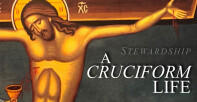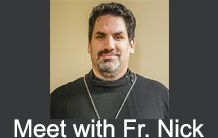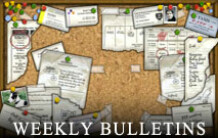The Seed & the Soil of Stewardship
Your enemy is a talent. So are the sun, moon, and stars. So is death. So is Monday.
I’m guessing that doesn’t make much sense to you right now.
That’s because, when we hear the word “talent,” we think ability. But that word in the Kingdom of God actually means responsibility. Responsibility is an ability—the ability to respond. God created mankind as responsible creatures when He made them in His image. To the animals, He gave reflexes and reactions. To humans, He gave responsibility.
A talent in the ancient world is an amount measured by weight. A drachma was literally a handful. 100 drachmae were equal to a mina (which means “part” or “portion”). 60 minas were equal to a talent. So, you could say a talent is 6,000 handfuls.
It’s interesting that a talent is literally 6,000 handfuls because St. Ephraim the Syrian links the parable of the Sower and the Seed to the parable of the ten talents. When a sower goes out to sow his seed, he is taking handfuls of seed—thousands of them—and giving them to the ground to be received. The seed has life in it, but it must be received by good soil to produce fruit. So too it is with the parable of the talents. A measured amount was given to each servant and each servant was responsible for receiving that amount and producing more with it. The end analysis of their faithfulness was not based on what they were given, but what they did with it.
The seed that was sown was the “logos” of the Kingdom. It is the pattern—the paradigm—of the Kingdom. As we have seen previously, the logos of the Kingdom can be summarized in three parts:
- Deny yourself (self-denial)
- Take up your cross (self-sacrifice)
- Follow Me (self-submission to Christ the King)
In St. Paul’s opening words to the Ephesians, he writes about the stewardship of the fullness of the seasons, that all things in the heavens and upon the earth have now been brought together under the headship of Christ. Just as all things were first made through Him, now all things are being remade through Him. Everything in this world now bears this imprint—this divine DNA—of the cross: “Deny yourself, take up your cross, and follow Me.” This is what produces fruit. This is how the Kingdom grows.
Stewardship is the art of recognizing the logos of the Kingdom in every moment we are given by God and welcoming it with humble and steadfast hearts.
Stewardship has to do with how we receive an enemy, a rebellious child, a difficult spouse. Will we receive them with thanksgiving because we can see that they are the seed Christ is sowing into our hearts that His Kingdom might take root in us? Will we pray with St. Nicolai Velimirovich:
“Bless my enemies, O Lord. Even I bless them and do not curse them. Bless them and multiply them; multiply them and make them even more bitterly against me: so that my fleeing to You may have no return; so that all hope in men may be scattered like cobwebs; so that absolute serenity may begin to reign in my soul; so that my heart may become the grave of my two evil twins: arrogance and anger; so that I might amass all my treasure in heaven; ah, so that I may for once be feed from self-deception which has entangled me in the dreadful web of illusory life.”
Stewardship has to do with how we receive pain and suffering, hardship and loss. Will we receive them with thanksgiving and say with Job:
“Shall we actually accept good from God but not adversity? …Naked I came from my mother’s womb, and naked I shall return there. The Lord gave and the Lord has taken away. Blessed be the name of the Lord.”
Stewardship has to do with how we receive every single thing that comes our way at every single moment of our life. A true life of stewardship keeps the morning prayer of the Optina elders before the eyes of our hearts:
“Grant unto me, O Lord, that with peace of mind I may face all that this new day is to bring. Grant unto me to dedicate myself completely to Your Holy Will. For every hour this day, instruct and support me in all things. Whatsoever tidings I may receive during the day, teach me to accept tranquilly in the firm conviction that all eventualities fulfill Your Holy Will. Govern my thoughts and feelings in all I do and say. When things unforeseen occur, let me not forget that all comes down from You. Teach me to behave sincerely and rationally toward every member of my family, that I may bring confusion and sorrow to none. Bestow on me, my Lord, strength to endure the fatigue of the day, and to bear my part in all its passing events. Guide my will and teach me to pray, to trust, to hope, to suffer, to forgive, and to love. Amen.”
We have a failure of stewardship when the seed of the logos of the Kingdom is either not perceived, not fully received, or not prioritized so that it produces no lasting fruit. The problem with reception is in our hearts. Just as there is a three-part pattern to the Kingdom, so there are three hearts which are poor stewards:
- The hard heart (self-governing)
- The shallow heart (self-preserving)
- The distracted heart (self-indulging)
The hard heart does not have ears to hear. It doesn’t want to trouble itself with any other pattern than the pattern with which it was born, which is the pattern of the world. It cannot fathom another life other than the one it already has.
The shallow heart is in love with the theory of the cruciform life, but it cannot practice it. It talks the talk all day long but cannot walk the walk for one minute. It is the heart of that one Christian soldier in Sebaste who headed for the hot-tub rather than die in the freezing water. It will not survive the Great Tribulation.
The distracted heart is more worried about sucking the marrow out of this life than it is absorbing the seed of the Kingdom into itself. Its concern is with retirement plans and college funds, with popular culture and political news, with gourmet gorging or diet and exercise. Though the seed is received on Sunday along with the Body and the Blood, the King doesn’t sit on the throne of the heart during the week and so His Kingdom is outshined by the kingdom of dust and ashes.
Grow in stewardship as a congregation requires us to be mindful--to see things as they are and not as they appear to be. There is a daily need to test ourselves in order to see if we are walking faithfully according to the pattern of the cross or whether we are “enemies of the cross of Christ, whose end-goal is destruction, whose god is appetite, and glory is in their shame, who have their minds on earthly things.” (Phil 3:18-19) When we see our hardness, our shallowness, our distractedness, then we simply repent. And we keep on repenting just as St. John the Forerunner and Jesus the Christ would have us do. And He will keep sowing the seed and reaping the harvest.








Comments
Login/Register to leave a comment